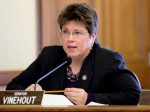State Pension Fund’s Risky Investments
Now invests in hedge funds, derivatives. And the annual return has declined.
“GOOD NEWS” read the text with a short article about how our pension funds grew 8.5%. My friend forwarded the article with a cryptic note, “apparently the lies keep working.”
In what seems to me to be an effort to get ahead of a bad story, the agency responsible for investing almost $100 billion in pension funds – the largest single pot of money anywhere in state government – issued a press release touting an 8.5% increase in its core fund.
As radio commentator Paul Harvey used to say, here’s the rest of the story.
Yes, things are better in 2016. However, in 2015, the state pension funds lost money. An increase over a loss is good but not nearly as good as continual year-to-year growth. Especially when the fund is assumed to return over 7% a year!
To understand how well Wisconsin is doing compared to other states, auditors contrasted performance in ten comparable state pension plans. Wisconsin’s performance ranked 9th of ten states in nearly every measure. Wisconsin’s core fund 5-year return was also considered 3rd most volatile of all of ten plans.
Wisconsin had a history of ranking well compared to other states. For example, in 2013, Wisconsin ranked 4th of nine states in 5-year returns.
The State of Wisconsin Investment Board (SWIB) oversees management of WRS and five other state insurance and trust funds. The governor appoints seven of the nine member board – 6 members directly and the governor-appointed secretary of administration.
In 2011, the governor and legislative majority gave SWIB authority to set its own budget and positions. No other state agency has this authority. Since 2011, the operating budget of SWIB grew by 78% and the number of positions grew by 48 or a 38% increase.
Some out-sourcing of fund management was brought back in-house. It is still unclear if this practice saved money.
Despite the fact the fund lost money in 2015, the board waived its own policy of not giving bonuses when the funds lost money. The board awarded bonuses of $1,100 to $468,300 to employees.
One of the reasons the funds lost money was poor performance in high-risk investments. Over the past few years, Wisconsin increased investment in risky financial devices like hedge funds and derivatives. These investments are among the speculative instruments that led to the financial crash in 2008.
Wisconsin also uses a risky strategy of borrowing to leverage assets. The use of debt to leverage assets lost money in all periods as of December 2015 including a negative 30% return in 2015. The leverage strategy contributed to the fund losses in 2015. Despite this, SWIB still has a goal of leveraging a staggering 20% of its funds.
Other audit findings raise questions about the structure and oversight the board provides the funds. Especially concerning is a finding that the board does not review final budget-to-actual expenses.
In addition, a recent audit of the Department of Employee Trust Funds, which manages the operations of the WRS, found a number of accounting errors, including mistakes in reporting over $90 million and bank reconciliations that were not done on a monthly basis for several months.
The state investment board oversees the retirement benefits of over 600,000 public employees and is now largely out from under legislative oversight. These recently released audits give us red flags about how things are going. Legislators have a responsibility to ask hard questions and insist on responses to protect the investments made by employees and retirees.
Sen. Kathleen Vinehout, D-Alma, is a member of the Wisconsin state Senate.
Op-Ed
-
Wisconsin Candidates Decry Money in Politics, Plan to Raise Tons of It
 Dec 15th, 2025 by Ruth Conniff
Dec 15th, 2025 by Ruth Conniff
-
Trump Left Contraceptives to Rot; Women Pay the Price
 Dec 8th, 2025 by Dr. Shefaali Sharma
Dec 8th, 2025 by Dr. Shefaali Sharma
-
Why the Common Council’s Amended Budget is Good Policy for Milwaukee
 Nov 20th, 2025 by Alds. Marina Dimitrijevic and Russell W. Stamper, II
Nov 20th, 2025 by Alds. Marina Dimitrijevic and Russell W. Stamper, II




















How is it that this fund gets high ratings year after year, then out of the blue better “legislative” oversight is called for? This call to arms just seems to invite the Walker administration to muck around in it. I was under the impression that it was unique and well crafted? Why not bring in creator? http://projects.jsonline.com/news/2016/9/26/wisconsins-fully-funded-pension-system-is-one-of-a-kind.html